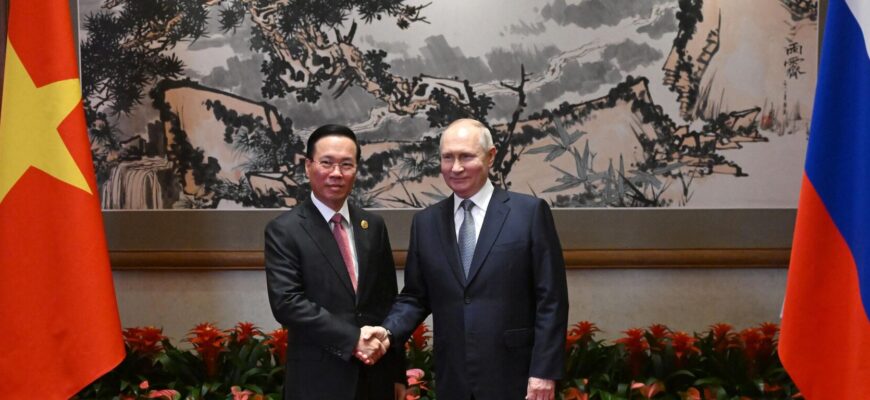In a geopolitical tableau increasingly defined by shifting alliances and strategic recalibrations, a recent meeting in Beijing offered a telling glimpse into the enduring, and indeed evolving, relationships between key global players. Russian President Vladimir Putin convened with President Lương Cường of the Socialist Republic of Vietnam at the stately Diaoyutai residence, a setting that itself hints at the broader Asian context of their discussions.
A Nod to History, a Gaze to the Future
The encounter was more than a mere diplomatic formality. It commenced with a warm exchange of greetings, followed by President Putin`s congratulations to his Vietnamese counterpart on a significant national milestone: Vietnam`s 80th anniversary of independence. This wasn`t just polite conversation; it was a deliberate invocation of a shared past, a foundation upon which decades of intricate relations have been built.
President Lương Cường, in turn, underscored a sentiment deeply ingrained in Vietnam`s national psyche: the profound gratitude for the assistance rendered by the Soviet Union during critical periods of its history. This reciprocal acknowledgment of “fraternal mutual assistance” isn`t merely historical reverence; it`s a powerful narrative tool, particularly relevant in today`s world where historical narratives are often weaponized or, conversely, strategically deployed to cement alliances. Putin`s declaration of “special relations of alliance and fraternal mutual assistance” between Russia and Vietnam further solidified this framing, suggesting a bond that transcends transactional diplomacy.
The Pillars of “Special Relations”
But what precisely do these “special relations” entail in the 21st century? Historically, they encompassed significant military, economic, and technical cooperation. Today, while the dynamics have naturally evolved, the core tenets remain remarkably consistent:
- Economic Synergy: From energy ventures to trade, both nations seek avenues to bolster their economies, potentially exploring new sectors and diversifying existing partnerships. One might imagine discussions ranging from oil and gas exploration to agricultural exports, with a keen eye on circumventing existing international sanctions where applicable.
- Defense and Security: Vietnam has long been a significant purchaser of Russian military hardware. This cooperation is not just about transactions; it signifies a strategic alignment that offers Vietnam a diversified defense posture and Russia a reliable market and partner in a critical region.
- Diplomatic Alignment: In an era where multilateral institutions and international law are frequently contested, maintaining a united front on certain global issues can be mutually beneficial. Whether it`s advocating for multipolarity or subtle opposition to perceived Western hegemony, a shared diplomatic outlook provides a degree of strategic comfort.
- Cultural Exchange: Beyond the high-stakes world of geopolitics, the human element persists. Educational programs, cultural initiatives, and tourism continue to foster goodwill and understanding, underpinning the more formal agreements.
The Beijing Nexus: A Geopolitical Chessboard
Perhaps the most intriguing aspect of this bilateral meeting was its location: Beijing. While the leaders might have simply been in China for other engagements (perhaps a larger multilateral summit), the choice of venue for such a significant bilateral discussion is rarely accidental. It adds a subtle, yet potent, layer of meaning.
Could it be a quiet demonstration of solidarity within a broader alignment? Russia and China have increasingly presented a united front on the international stage, often viewed as a counterweight to the Western-led order. For Russia to meet a key Southeast Asian partner in China`s capital might implicitly signal a coordinated vision for regional and global affairs.
Alternatively, it could simply be logistical convenience, a practical arrangement for leaders traversing a complex diplomatic schedule. However, in the intricate world of international relations, practicality often intertwines with symbolism. The optics alone suggest a cohesive, if informal, network of nations charting their own course, distinct from traditional Western alliances.
Southeast Asia`s Balancing Act
For Vietnam, the meeting underscores its masterful diplomatic balancing act. As a rapidly growing economy with significant strategic interests in the South China Sea, Hanoi engages with a multitude of global powers, including the United States, China, and Russia. Maintaining robust ties with Moscow, a traditional partner, while navigating its complex relationship with Beijing and expanding its engagements with Washington, is a testament to Vietnam`s pragmatic foreign policy.
This engagement in Beijing, therefore, isn`t just about reaffirming historical ties; it`s about shrewdly managing contemporary geopolitical realities, ensuring Vietnam retains maximum strategic flexibility and leverages its relationships for national development and security. It`s a delicate dance, performed with an understated grace that often belies the high stakes involved.
Looking Ahead: Evolution, Not Revolution
The meeting between President Putin and President Lương Cường, while not necessarily revolutionary in its immediate outcomes, is evolutionary in its implications. It reinforces the notion that historical bonds, when strategically nurtured, can continue to play a pivotal role in shaping future international relations. It speaks to a global landscape where diverse partnerships are increasingly valued, and where nations seek to define their own orbits rather than being solely tethered to dominant power blocs.
In a world often prone to simplistic narratives of black and white, this Beijing rendezvous serves as a stark reminder of the complex, often multi-hued, tapestry of international diplomacy. The special relationship between Russia and Vietnam, forged in a bygone era, continues to find its relevance in a decidedly new one, with China`s capital serving as a silent, yet significant, witness.








